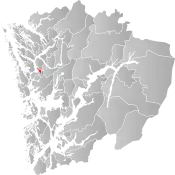Bergen landdistrikt
Bergen landdistrikt (English: Bergen rural district) is a former municipality in the old Hordaland county in Norway. The municipality existed from 1838 until 1877 when it was merged into the neighboring city of Bergen. Bergen landdistrikt encompassed about 5 square kilometres (1.9 sq mi) of land surrounding the city of Bergen, including the present neighborhoods of Møhlenpris, Nygård, Kalfaret, Sandviken, and Ytre Sandviken as well as the mountains Fløyfjellet and Sandviksfjellet.[2]
Bergen landdistrikt herred
Domkirken og Korskirken landsogn (historic) | |
|---|---|
 Bergen landdistrikt included the areas south of the city centre (the small bay and peninsula in the centre of the photo) and on the east side, along the fjord. | |
 Hordaland within Norway | |
 Bergen landdistrikt within Hordaland | |
| Coordinates: 60°23′30″N 05°21′07″E | |
| Country | Norway |
| County | Hordaland |
| District | Midhordland |
| Established | 1 Jan 1838 |
| • Created as | Formannskapsdistrikt |
| Disestablished | 1 Jan 1877 |
| • Succeeded by | Bergen Municipality |
| Administrative centre | Bergen |
| Government | |
| • Mayor (1870-1876) | Ditlef Bruland |
| Area (upon dissolution) | |
| • Total | 5 km2 (2 sq mi) |
| Population (1877) | |
| • Total | 4,883 |
| • Density | 980/km2 (2,500/sq mi) |
| Demonyms | Bergenser Bergensar[1] |
| Time zone | UTC+01:00 (CET) |
| • Summer (DST) | UTC+02:00 (CEST) |
| ISO 3166 code | NO-1281 |
History
The city of Bergen has been established for centuries. From 1776 to 1789, the royal boundary surveying commission conducted a survey of the area to formally establish the boundaries of the city. The areas that were left outside the city boundaries were still part of the local Domkirken and Holy Cross Church parishes. The areas outside the city limits were referred to as the rural parishes of the city's churches. The area south of the city was called the Domkirken landsogn and the area east of the city was the Korskirkens landsokn ("landsogn" means rural parish). On 1 January 1838, all parishes in Norway were established as civil municipalities (see formannskapsdistrikt law). The two "rural parishes" of Bergen Cathedral and Holy Cross Church were merged to form the municipality called "Bergen landdistrikt". Initially, the new municipality had about 1500 residents.[3]
In 1873, the city of Bergen requested that Parliament transfer Bergen landdistrikt to the city since a large part of the inhabitants of the rural parish worked in the city, and many of the city's businesses were located in Bergen landdistrikt. The rural parish was against the merger, but the Parliament agreed with the city and Bergen landdistrikt was incorporated into Bergen on 1 January 1877. There were 4,883 residents of the municipality at the time of its dissolution. Upon the merger, the municipality was transferred to the city, but it also switched from Søndre Bergenhus county to Bergen county.[4]
Name
The municipality (originally the parish) is named after the neighboring city of Bergen (Old Norse: Bjǫrgvin). The first element comes from the word bjǫrg which means "mountain" and the word vin which means "meadow" or "pasture". The last element of the name is the modern Norwegian word landdistrikt meaning "rural district" since it was the rural area surrounding the city.[5]
Government
During its existence, this municipality was governed by a municipal council of directly elected representatives. The mayor was indirectly elected by a vote of the municipal council.[6]
References
- "Navn på steder og personer: Innbyggjarnamn" (in Norwegian). Språkrådet.
- Thorsnæs, Geir, ed. (28 September 2014). "Bergen landdistrikt". Store norske leksikon (in Norwegian). Kunnskapsforlaget. Retrieved 9 February 2020.
- "Domkirkens og Korskirkens landsogn" (in Norwegian). Bergen Byarkiv. Retrieved 6 September 2014.
- Jukvam, Dag (1999). "Historisk oversikt over endringer i kommune- og fylkesinndelingen" (PDF) (in Norwegian). Statistisk sentralbyrå. ISBN 9788253746845.
- Thorsnæs, Geir, ed. (1 June 2023). "Bergen". Store norske leksikon (in Norwegian). Kunnskapsforlaget. Retrieved 21 June 2023.
- Hansen, Tore; Vabo, Signy Irene, eds. (20 September 2022). "kommunestyre". Store norske leksikon (in Norwegian). Kunnskapsforlaget. Retrieved 1 January 2023.
- "Ordførere (oversikt)". Bergen Byleksikonet (in Norwegian). 21 May 2013. Retrieved 20 June 2023.

